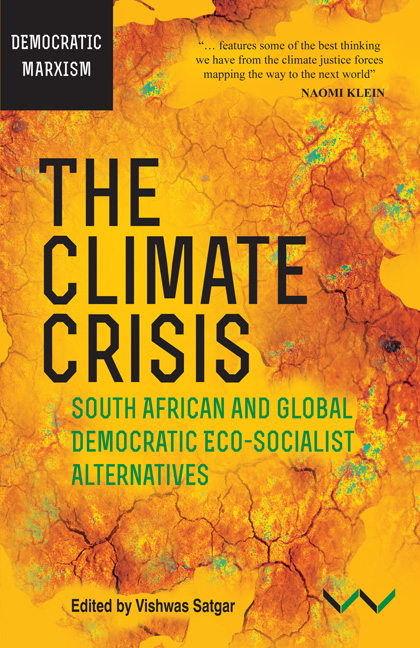Book contents
- Frontmatter
- Contents
- Tables and Box
- Acknowledgements
- Acronyms and Abbreviations
- Chapter 1 The Climate Crisis and Systemic Alternatives
- PART ONE THE CLIMATE CRISIS AS CAPITALIST CRISIS
- PART TWO DEMOCRATIC ECO-SOCIALIST ALTERNATIVES IN THE WORLD
- Chapter 4 The Employment Crisis, Just Transition and the Universal Basic Income Grant
- Chapter 5 The Rights of Mother Earth
- Chapter 6 Buen Vivir: An Alternative Perspective from the Peoples of the Global South to the Crisis of Capitalist Modernity
- Chapter 7 Challenging the Growth Paradigm: Marx, Buddha and the Pursuit of ‘Happiness’
- Chapter 8 Ubuntu and the Struggle for an African Eco-Socialist Alternative
- Chapter 9 The Climate Crisis and the Struggle for African Food Sovereignty
- PART THREE DEMOCRATIC ECO-SOCIALIST ALTERNATIVES IN SOUTH AFRICA
- CONCLUSION
- Contributors
- Index
Chapter 7 - Challenging the Growth Paradigm: Marx, Buddha and the Pursuit of ‘Happiness’
from PART TWO - DEMOCRATIC ECO-SOCIALIST ALTERNATIVES IN THE WORLD
Published online by Cambridge University Press: 05 June 2019
- Frontmatter
- Contents
- Tables and Box
- Acknowledgements
- Acronyms and Abbreviations
- Chapter 1 The Climate Crisis and Systemic Alternatives
- PART ONE THE CLIMATE CRISIS AS CAPITALIST CRISIS
- PART TWO DEMOCRATIC ECO-SOCIALIST ALTERNATIVES IN THE WORLD
- Chapter 4 The Employment Crisis, Just Transition and the Universal Basic Income Grant
- Chapter 5 The Rights of Mother Earth
- Chapter 6 Buen Vivir: An Alternative Perspective from the Peoples of the Global South to the Crisis of Capitalist Modernity
- Chapter 7 Challenging the Growth Paradigm: Marx, Buddha and the Pursuit of ‘Happiness’
- Chapter 8 Ubuntu and the Struggle for an African Eco-Socialist Alternative
- Chapter 9 The Climate Crisis and the Struggle for African Food Sovereignty
- PART THREE DEMOCRATIC ECO-SOCIALIST ALTERNATIVES IN SOUTH AFRICA
- CONCLUSION
- Contributors
- Index
Summary
It is disappointing to many that the GDP growth paradigm, while the subject of critical debate, has reasserted itself after the 2007–2009 financial crisis. As the science of human-induced climate change becomes irrefutable, the global power elites, employing the art of paradigm maintenance, have morphed the hegemony of neoliberal economics into what is called the ‘green economy’ – a continuation of the post-Brundtland attempt to reduce ‘sustainable development’ to ‘sustain development’ (Wanner 2007). In this new phase, green technologies are rolled out to buttress the notion that economic growth can be ‘decoupled’ from resource depletion and carbon emissions. In other words, we can have our cake and eat it.
These ideas have filtered down into South Africa's National Development Plan (NDP), which maintains a commitment to the minerals–energy complex, informalised jobs growth and continued massive social inequality – but with a green twist. Indeed, there has been a concerted rollout of renewable energy in South Africa, but this is still by far subsumed under a fossil fuel-based growth economy (given this country's abundance of coal), with the threat of expanded nuclear energy.
Can South Africa, or any developing country, escape this extractivist growth paradigm? Indeed, should developing countries commit much to the global efforts towards reducing carbon emissions, given their massive social deficits (including jobs, education, health care, housing)? Or can they leapfrog dirty development pathways, using green technologies? Is the emerging ‘degrowth’ paradigm only applicable to ‘overdeveloped’ countries of the north, which need to stop growing in order for developing countries to grow – thus lowering the average growth rate for the global economy? Indeed, is the measurement of growth using the GDP metric a useful indicator of both economic growth and social welfare, or should we be considering alternatives? Should alternatives embrace a radical eco-socialist utopian vision, notwithstanding massive resistance, from above and below – given the manner in which society has become invested in the consumer economy? These are questions that are increasingly occupying centre stage as the world considers post-carbon futures.
This chapter situates the argument within the global ecological–economic– social crisis, the GDP problem and global hegemonic interests.
- Type
- Chapter
- Information
- Climate Crisis, TheSouth African and Global Democratic Eco-Socialist Alternatives, pp. 148 - 167Publisher: Wits University PressPrint publication year: 2018



